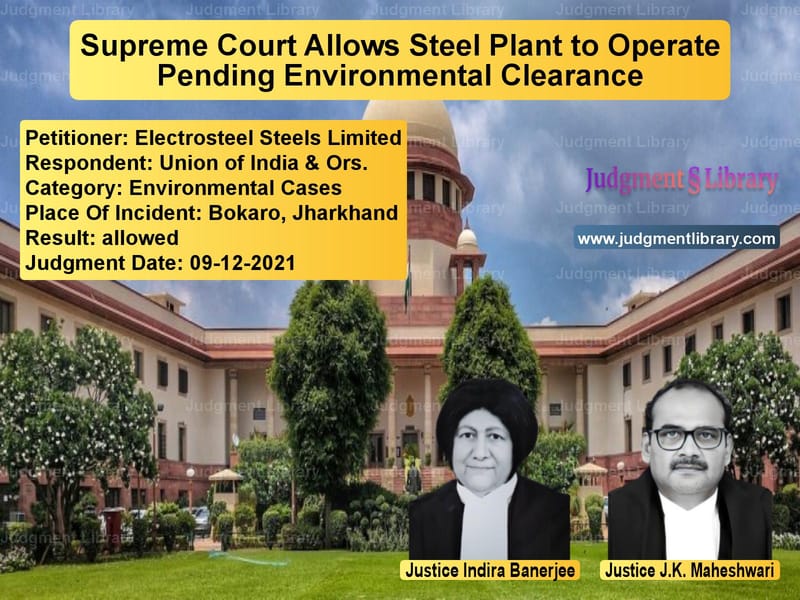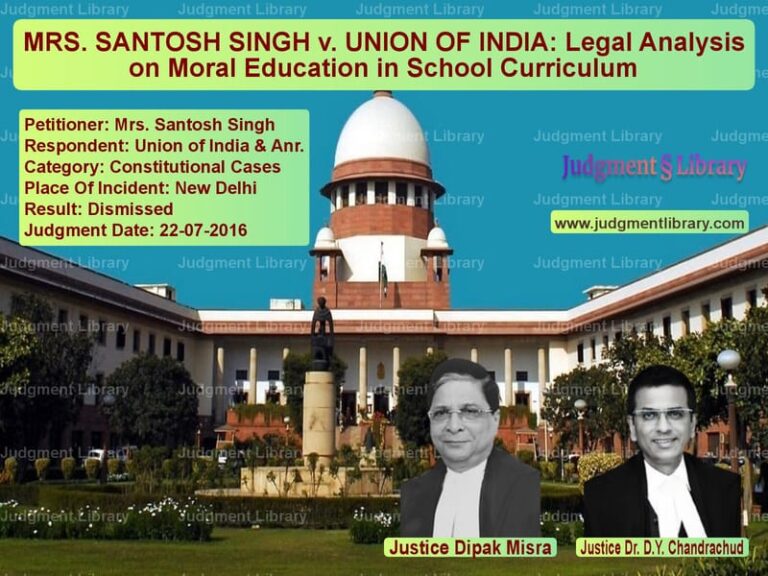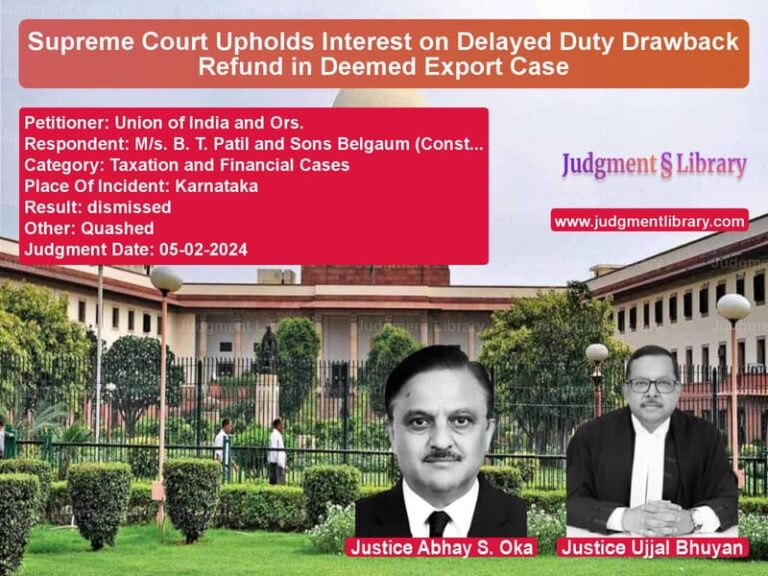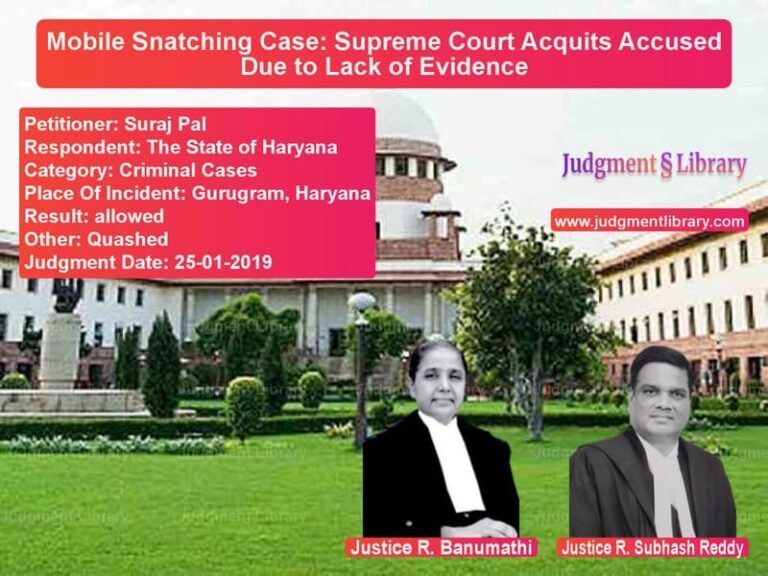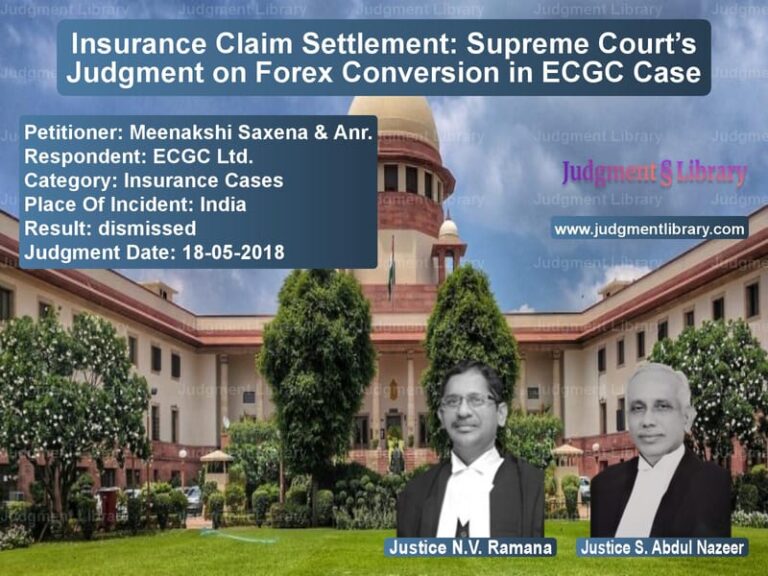Supreme Court Allows Steel Plant to Operate Pending Environmental Clearance
The case of Electrosteel Steels Limited vs. Union of India & Ors. concerns the legality of a steel plant’s operation without prior environmental clearance (EC) and whether such clearance could be granted retrospectively. The Supreme Court ruled in favor of Electrosteel Steels Limited, allowing the plant to operate while the authorities process its revised environmental clearance application.
Background of the Case
Electrosteel Steels Limited owns and operates a 1.5 MTPA integrated steel plant in Bokaro, Jharkhand. The company, which employs over 10,000 workers, was acquired by Vedanta Ltd. in 2018 through the Corporate Insolvency Resolution Process (CIRP) under the Insolvency and Bankruptcy Code.
However, the company faced legal hurdles when it was found that the steel plant was not located at the originally approved site. The plant was supposed to be set up at Mauza South Parbatpur but was instead constructed in Mauza Bhagabandh, about 5.3 km away. This relocation led to allegations of environmental violations, including encroachment on forest land.
Legal Dispute
The Jharkhand State Pollution Control Board (JSPCB) and the Ministry of Environment, Forest, and Climate Change (MoEF&CC) alleged that Electrosteel had violated the Environmental Protection Act, 1986, and revoked its environmental clearance in 2018.
The Jharkhand High Court initially granted an interim stay, allowing the steel plant to operate under regulatory supervision. However, in 2020, the High Court lifted the interim protection, leading to Electrosteel filing an appeal in the Supreme Court.
Key Legal Issues
- Can environmental clearance be granted retrospectively?
- Should an operational steel plant employing thousands of workers be shut down due to a technical violation?
- Is the company liable for pollution control penalties under the “polluter pays” principle?
Arguments of the Parties
Arguments by Electrosteel Steels (Appellant)
The company contended that:
- The shift in location was minor and did not significantly alter the environmental impact assessment.
- It had already obtained environmental clearance for the plant at South Parbatpur, and the new location was within the same environmental impact zone.
- The government had previously allowed similar ex post facto clearances under special conditions.
- Immediate shutdown of the plant would cause massive unemployment and disrupt the regional economy.
Arguments by the Union of India (Respondent)
The government and pollution control board argued:
- Electrosteel had violated the conditions of its environmental clearance by shifting the plant without approval.
- Encroachment on 220 acres of forest land was a serious offense under the Forest Conservation Act, 1980.
- Ex post facto clearance was not legally permissible and would set a dangerous precedent for environmental law.
- The company should pay penalties under the “polluter pays” principle before seeking any clearance.
Supreme Court’s Analysis and Judgment
The Supreme Court examined the legal provisions of the Environmental Protection Act, 1986 and past precedents, including the case of Alembic Pharmaceuticals Ltd. v. Rohit Prajapati, where ex post facto clearances were debated.
Ex Post Facto Environmental Clearance
The Court acknowledged that environmental clearance should ideally be obtained before starting industrial projects. However, it also recognized that:
“The 1986 Act does not prohibit ex post facto Environmental Clearance. Some relaxations and even grant of ex post facto EC in accordance with law, in strict compliance with Rules, Regulations, and applicable orders, in appropriate cases, where the projects are in compliance with or can be made to comply with environmental norms, is not impermissible.”
Thus, the Court ruled that ex post facto clearances are not illegal per se but must be granted cautiously, considering public interest and environmental impact.
Impact on Employment and Economy
The Supreme Court highlighted the economic impact of closing the plant:
“In passing the impugned order, the High Court overlooked the consequences of closure of an integrated steel plant with a workforce of 300 regular and 700 contractual workers.”
The Court emphasized that a balance must be maintained between environmental protection and economic sustainability.
Polluter Pays Principle
The Court held that even if the plant was allowed to operate, the company could still be penalized for environmental violations:
“The deviant industry may be penalized by an imposition of heavy penalty on the principle of ‘polluter pays’ and the cost of restoration of the environment may be recovered from it.”
Final Judgment
The Supreme Court ruled in favor of Electrosteel Steels Limited:
- The High Court’s order lifting the interim protection was set aside.
- The company was allowed to continue operations under regulatory supervision.
- The MoEF&CC was directed to process Electrosteel’s revised environmental clearance application within three months.
- Any additional penalties under environmental laws would be decided separately.
Key Takeaways from the Judgment
- Ex post facto environmental clearance is not outright illegal: The Court acknowledged that under special circumstances, it can be granted.
- Balancing environmental and economic concerns: Shutting down large industries without considering the social and economic impact is not advisable.
- Penalties for violations remain valid: Companies violating environmental norms can still be penalized under the “polluter pays” principle.
- Regulatory compliance must be prioritized: The government must ensure stricter monitoring to prevent similar violations in the future.
- Government agencies must act promptly: The ruling directs authorities to process environmental clearances within a fixed timeline.
Conclusion
The Supreme Court’s ruling provides a significant precedent on how environmental laws should be enforced without crippling industries. While environmental compliance is essential, the Court recognized that regulatory procedures should not be misused to create economic hardship. The decision ensures that Electrosteel’s steel plant continues operating while legal compliance is being addressed, striking a balance between environmental protection and industrial development.
Petitioner Name: Electrosteel Steels Limited.Respondent Name: Union of India & Ors..Judgment By: Justice Indira Banerjee, Justice J.K. Maheshwari.Place Of Incident: Bokaro, Jharkhand.Judgment Date: 09-12-2021.
Don’t miss out on the full details! Download the complete judgment in PDF format below and gain valuable insights instantly!
Download Judgment: electrosteel-steels-vs-union-of-india-&-ors-supreme-court-of-india-judgment-dated-09-12-2021.pdf
Directly Download Judgment: Directly download this Judgment
See all petitions in Environmental Cases
See all petitions in Corporate Compliance
See all petitions in unfair trade practices
See all petitions in Judgment by Indira Banerjee
See all petitions in Judgment by J.K. Maheshwari
See all petitions in allowed
See all petitions in supreme court of India judgments December 2021
See all petitions in 2021 judgments
See all posts in Environmental Cases Category
See all allowed petitions in Environmental Cases Category
See all Dismissed petitions in Environmental Cases Category
See all partially allowed petitions in Environmental Cases Category

